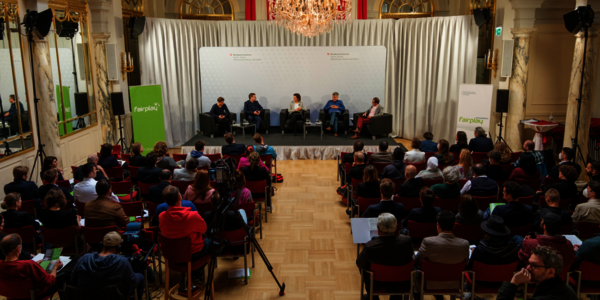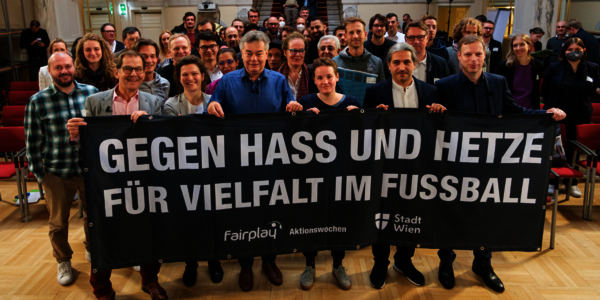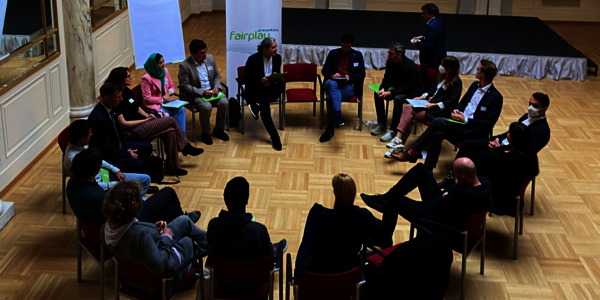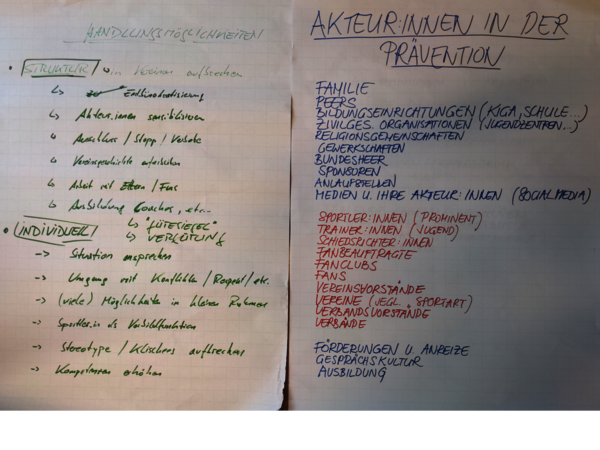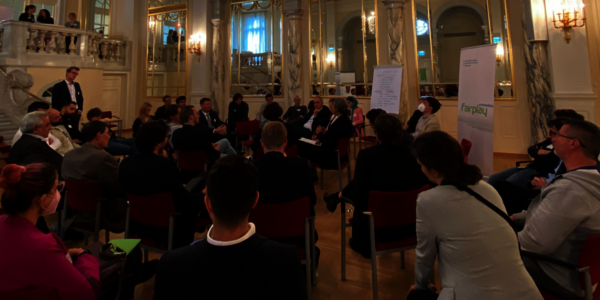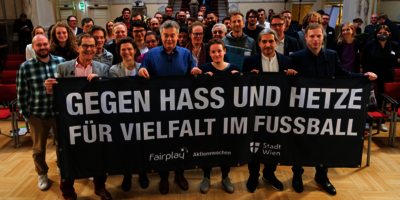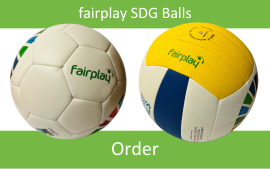Project presentation: fairplay prevention – point of contact against dehumanizing ideologies
More than 80 participants accepted the invitation of the Federal Ministry of Arts, Culture, Public Service and Sport (BMKÖS) and the fairplay initiative.
The event began with a panel discussion that was broadcast live on ORF SPORT+. Vice-Chancellor and Minister of Sport Werner Kogler opened the day. In the afternoon, the programme continued in small groups. Representatives of the major Austrian sports organisations, professional and umbrella associations, clubs and gyms as well as experts from the fields of youth and prevention work, documentation centres, migrant self-organisation, politics, science and journalism were present. The time between the programme items was used for networking at the buffet.
Panel discussion
The panel of the ORF live discussion round was top-class. Federal Minister Werner Kogler, ÖFB Managing Director Thomas Hollerer, Lena Schögl from the project Kicken ohne Grenzen and Anna Traninger from fairplay prevention discussed the issue. The panel discussion was moderated by former ORF sports anchorman Michael Berger.
In his opening statement, Federal Minister Werner Kogler emphasised the need to consider the prevention of extremism as a task for society as a whole. Sport had a specific responsibility:
"Threats, degradation and extremist ideas are phenomena that the whole of society is confronted with. Sport is not an island of the blessed, but rather a focal point for some of these tendencies. Through sport, broad sections of the population can be reached and sensitised. We want to use this opportunity to use sport to counteract questionable developments that are spreading, for example, via the so-called social media. Extremism has no place in sport!"
For this reason, the BMKÖS is funding projects in the field of preventing extremism in sport until 2025. Three of them were presented on the podium by Kicken ohne Grenzen, the Austrian Football Association and the fairplay initiative.
From now on, fairplay prevention will support players from the sports sector throughout Austria in taking a clear stance against right-wing extremism and extremism based on religion. Anna Traninger, project officer at fairplay and responsible for the new area of work, explains why good prevention work is urgently needed: "Right-wing extremists and Islamist actors use sport as a platform for spreading their content, for agitation and for recruiting new members. Prevention means strengthening the resilience of sports structures, raising awareness of anti-human ideologies, informing about right-wing extremist and Islamist activities and networks, and taking appropriate measures as needed."
After the opening statements of the panellists, Michael Schmied, also project officer of fairplay prevention, gave an insight into the need for prevention work in the Austrian sports landscape and why the project speaks of "anti-human ideologies" and not of extremism: "The term extremism suggests that it is only about the fringes of society and that the 'centre' of society has nothing to do with it."
The ÖFB is also aware that there are radicalisation tendencies in football. The ÖFB wants to fight against this with the project Learning Curve Stadium, of which General Secretary Thomas Hollerer reports: "As the Austrian Football Association, we are facing up to our responsibility. In our project, for example, we offer workshops for young people in football stadiums through the Learning Curve Stadium. This project is being expanded significantly. In specific cases, we offer training and support for clubs and also want to raise awareness through campaigns."
The association "Kicken ohne Grenzen" focuses on prevention with education through sport: "We use football as a tool to teach social skills through workshops. We structure our exercises in such a way that certain topics such as communication skills, frustration tolerance or conflict resolution skills are included in the football exercises. Afterwards, we reflect with the participants on how the experiences can be transferred to everyday life. Our coaches are trained in the areas of coaching, pedagogy and social work. Our experience so far shows that our offers are well received and that there is a great willingness to learn," says Lena Schögl from "Kicken ohne Grenzen" about the project "Play Fair!
Against Hate & Incitement - for Diversity in Football
Directly after the panel discussion, the ambience in the Haus des Sports was used for a joint group photo under the title of the currently running fairplay action weeks: Against Hate and Incitement - for Diversity in Football. The campaign in cooperation with the ÖFB and the Austrian Football League sends a clear signal against right-wing extremism in football. All Austrian football clubs are invited to participate until the end of October.
During the break between the programme items, a small snack in the form of finger food and drinks was waiting for the participants in the sports café. The opportunity for informal discussions and getting to know each other was used intensively. The great interest in exchange and networking was also reflected in the large number of participants who took part in the rest of the programme.
Workshops on the promotion and participation of resilience in sport
The afternoon began with three parallel workshops. The small groups were facilitated by Niki Staritz, David Hudelist and Michael Schmied. In this format, it was possible to delve more concretely into the matter of prevention work and to work out specific challenges and potentials in sport. The different perspectives of the multidisciplinary working groups were particularly exciting to follow.
The general conditions were discussed, such as a lack of awareness in sports structures, but also the pressure to perform and succeed, as well as a hierarchical "us and them" way of thinking that fosters anti-human ideologies in sports. Gender relations in sport and the lack of offers to promote diversity were discussed. The largely voluntary organisation of sports clubs as well as the difficulty of placing social topics in densely packed training courses were discussed as further areas of tension for prevention work in sport.
At the same time, sport was again seen as having great potential for addressing and implementing socio-politically relevant issues. The low-threshold access to young people was particularly emphasised. Possible courses of action in case of incidents were discussed on an individual and structural level, and relevant actors for cooperation in prevention were identified.
Finally, the contents of the small groups were brought together in the form of a fishbowl discussion. In this way, all participants were able to get a picture of the workshops running in parallel.
The great interest, the diverse discussions and a full Haus des Sports clearly show the explosive nature of the topic. The opportunity to come together and exchange ideas was actively used at the event. The task now is to build on these debates, to consolidate the contacts made and to expand networks.
And to always keep a watchful and critical eye on their own work: "That's a bit of a stupid thing about this topic, that it always sounds so negative. But we also gain a lot. We gain something when we fight for it and fight for the fact that in a free society other things are possible, should be possible, should be done together - it doesn't happen on its own. The free society has a problem. It is so free that it is not easy to attack it from within. And we have this phenomenon everywhere. And that's why I find it so interesting in sport." Werner Kogler
With this in mind, the fairplay prevention team would like to thank everyone for their active participation in the event and will start its work with renewed vigour.
For a solidary and open sport and club culture!
All information can be found at fairplay-prevention.at.
The needs analysis can be downloaded here.


